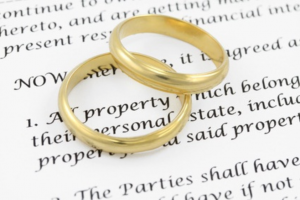When a client consults with us on a divorce matter, one of the more common questions is, what’s going to happen to the house? And this isn’t just a common question that clients ask attorneys, but also a common question that attorneys ask their own clients! The reason for this is two-fold: If the couple owns their home then it is likely the biggest asset; and divorcing spouses have a good bit of freedom in deciding what to do with the marital home. But sometimes, a judge needs to step in and decide for the couple that the house will be sold.
The marital home is an asset, like most other assets. The rule in New Jersey is that marital assets are generally subject to equitable distribution, which is basically a fancy word for dividing it according to what is fair. The problem with a house is that it’s not like a bank account – you cannot cut the house in two and divide it up. Unlike a box of jewelry, you cannot give some pieces to one person and the rest to the other. And unlike almost all assets, a house will typically be encumbered by a mortgage and will always take some time to market it and sell it. Oh, and more importantly, someone probably lives in it.
The original question of this post is whether a judge can order the sale of the marital home. The answer is yes, but it rarely happens.
If the couple does nothing and there is no settlement, a judge could have a trial and determine that the house should be split 50/50, and order it sold because there is no other way to divide the asset. But in most situations, the couple does work out a settlement of some kind. As described above, there are so many characteristics of the home that make it unlike most other assets. Therefore, a couple during a divorce will usually work something out that makes sense for their particular situation.
One of the more common examples of this occurs when one spouse keeps the house entirely and in exchange forfeits their rights to some other asset (like money in bank accounts, alimony payments, etc.). The spouse that keeps the house would typically agree to make arrangements with the bank to get the other spouse off of the mortgage and then continue making all of the mortgage payments themselves. This arrangement may work out without a problem, but it could also cause additional issues. For example, what happens when the spouse who keeps the house simply fails to take the other spouse off of the mortgage?
This was the situation that occurred in a the recent case of L.H. v. D.H., which was decided in November in Ocean County. There, the wife was supposed to continue making payments on the mortgage and refinance the mortgage so that only she was on it. This never happened and the husband asked the judge to appoint him attorney-in-fact and allow him sole authority to sell the home, satisfy the mortgage, and divide the remaining funds. And the judge agreed with him and ordered the sale. The court reasoned that the husband was being damaged – the wife made late payments that hurt his credit and he had trouble securing another mortgage for a new home. The court held that these were legitimate damages and he was entitled to court assistance in resolving the issue. Therefore, this is another situation where the court could order the sale of the marital home, and interestingly, this would happen after the divorce action is already over.


